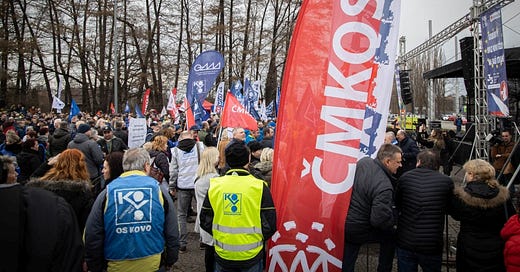Trade unions warn that tens of thousands of jobs are at risk due to Liberty Steel’s mismanagement.
This post is the first in a series that will feature short posts covering labour union news across Europe. There will be two short posts each week published on Tuesday and Thursday.
Photo of protesting Liberty Steel workers in Ostrava. From: https://www.oskovo.cz/aktualityoskovo/fotoreportaz-protestni-mitink-os-kovo-pred-liberty-ostrava-22-unora-2024
Back in early February, trade unions met with representatives from GFG Alliance and Liberty steel in a crisis meeting as it was revealed that the state of the company’s finances are in dire shape. As the situation escalated, trade unions across the continent organised a day of actions at Liberty Steel plant locations on the 22nd of February.
Liberty Steel / GFG Alliance is a large steel manufacturer with locations across the continent and some plants have been at a standstill for months. The company is owned by steel mogul Sanjeev Gupta, once heralded as the “saviour of Britain’s steel” and currently under investigation in the United Kingdom for fraud and money-laundering. The mogul currently resides in Dubai, despite owning an $80 million home in London and $38 million mansion in Sydney.
He insists that his move to Dubai has nothing to do with the current investigation into his finances and instead claims that it’s convenient in terms of the time zones his companies operate in.
Steel plants at a standstill
While production is down to 1% in some plants, the stop in production means that millions of euros will need to be spent to repair the idled plants.
According to the union confederation IndustriALL, more than 20,000 steel workers across the Czech Republic, Poland, Romania, Belgium, Luxemburg, Italy, and Hungary are either unable to work due to plant closures or are waiting to see what the future holds for the company. If you include the indirect jobs dependent on the steel factories, the impact will be catastrophic for many more thousands of workers.
Ostrava at the centre of the crisis
One of the most critical situations is in the Liberty Steel plant in Ostrava, the Czech Republic. A total of 30,000 direct and indirect jobs might are at risk if the plant closes. The plant has been shut down for months since its main energy supplier, Tameh, declared insolvency (allegedly due to a failure by Liberty Steel to make energy payments).
Now, after a period of negotiations, Liberty Steel has presented a restructuring plan to creditors that would drop production by 60% and fire 3,000 employees, according to the president of the local trade union OS KOVO. The number of additional job losses by suppliers and distributors would likely also be in the thousands. Gupta’s liberty steel also proposed buying the energy supplier Tameh outright while apparently refusing to settle existing debts. The offer was rejected by Tameh.
In response to the broader crisis, IndustriALL Europe has called for Gupta to release information on the financial state of affairs of GFG alliance, the European Commission to set up a task force to ensure the future of Europe’s steel industry, and for countries to set up conditions for any future public funding to companies owned by Sanjeev Gupta.
Steel, crises, and the just transition
The steel crisis comes at a time when the industry is increasingly essential. Both environmentally, for steel’s importance in the energy transition and the need to decarbonize steel production, and socially, to prevent further deindustrialisation and its sociopolitical consequences.
The current steel crisis is aggravated by high energy costs across Europe, an overproduction of steel in China, and national subsidies in the United States’ Inflation Reduction Act to be less reliant on steel imports from abroad.
Elsewhere, European countries are making ambitious investments to produce steel via less-polluting methods. Were Liberty Steel’s plants to close, not only will tens of thousands of jobs be lost due to mismanagement, Europe will also lose an opportunity to spearhead the just transition.




